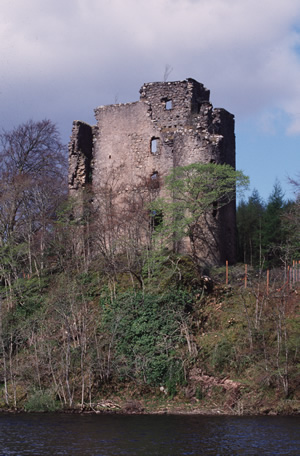

Invergarry Castle was the seat of the Chiefs of the MacDonells of Glengarry, a powerful branch of the Clan Donald, known as the Clan Ranald of Knoydart and Glengarry. Its situation on Creagan an Fhithich - the Raven's Rock - overlooking Loch Oich in the Great Glen, was a strategic one in the days of clan feuds and Jacobite risings.


It is not certain when the first structure was erected on Creagan an Fhithich but there are sites of at least two prior to the present Castle.
The present structure was designed on the "L" plan, with a round tower at the north-east angle. The main building rose to five and the angle tower to six storeys in height. The hall, on the first floor, measured 44 by 20 feet.
Prince Charles Edward Stuart- "Bonnie Prince Charlie" - visited the Castle in 1745, shortly after the raising of the Royal Standard at Glenfinnan and is said to have rested there after his defeat at Culloden, in 1746. The redcoats of "Butcher" Cumberland burned it in 1746 after the Battle of Culloden but the stout walls refused to yield and have survived the centuries to serve as a reminder to their glorious past.
The Chief during the late 18th and early 19th centuries, was Alasdair Ranaldson MacDonell, the subject of a famous portrait by Sir Henry Raeburn, which now hangs in the Scottish National Gallery, Edinburgh. This chief is said to have been Sir Walter Scott's prototype for Fergus MacIvor, a principal character in his novel "Waverley".
Historically Important Dates
1610-40
Building of first Castle of Invergarry
1645 Glengarry raided by the Covenanters
1646 Montrose visited the Castle
1654 Castle destroyed by General Monk
c.1660-65 Building of the new Castle
1690 Jacobite officers took refuge in the Castle
Invergarry lands declared forfeit
Glengarry built new fortifications
1692 Occupation by English troops
1715 Glengarry regained possession by force
1716 Reoccupied by English troops
Castle burned down
1727 Occupation by Thomas Rawlinson
1731 Glengarry regained the Castle as his home
1745-46 Prince Charles visited before and after Culloden
1750 Final destruction of the Castle
1838 The Glengarry portion of the estate sold to Marquis of Huntly
1839 Glenquoich estate sold to 'Bear' Ellice
1860 'Bear' Ellice added the Glengarry portion of his estate to his Glenquoich holding
This listing reproduced by permission of Glengarry Heritage Centre